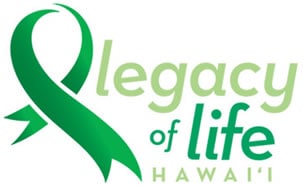Guide for Medical Professionals
Legacy of Life Hawai'i is committed to maintaining strong partnerships with Hawaii hospitals and all medical-related professionals as well as our local transplant center. Together, we strive to achieve the goal of saving lives in our community through organ, tissue and eye donation.
Saving lives through organ and tissue donation is a 24 hour, 365 day per year responsibility.
Clinical Services
Legacy of Life Hawai'i (LLH) has clinical staff available at all times – 24 hours a day, 365 days a year – to facilitate the gift of donation. Procurement Transplant Coordinators manage the clinical aspects of the donation process, such as working with the hospital staff to maintain the donor's organ function, collaborating with UNOS to impartially match the donor's organs with waiting recipients, and coordinating the organ recovery surgery. Potential organ donors may donate up to eight organs: the heart, lungs, liver, kidneys, pancreas, and small intestine.
In addition to organ donation, many people are able to donate tissues such as corneas, bone, skin, heart valves, and veins after cardiac death. Tissue grafts are used in life-enhancing surgical procedures including treatment for sports injuries (such as torn ligaments), post-mastectomy reconstruction, skin grafts for burns, bone grafts to replace diseased or traumatized bone, and hernia repairs. In the U.S. alone, over 1 million tissue grafts are transplanted every year.
Who to Call
Please call Legacy of Life Hawai'i's 24-hour referral line at 1-800-695-6554 once a potential donor is identified. Our coordinators will do a brief telephone assessment of the patient to determine suitability. If appropriate, an LLH coordinator will do an on-site review of the patient's chart and develop a plan of communication with the hospital staff. Legacy of Life Hawai'i's Family Services Coordinators will facilitate a family donation discussion should it become appropriate.
Identifying a Potential Donor
A timely referral of a potential donor saves lives. CMS conditions of participation require hospitals to refer all deaths and imminent deaths to Legacy of Life Hawai'i. Imminent death is defined as a ventilator-dependent patient with a Glasgow Coma Score (GCS) less than five. Patients should be referred within one hour of meeting these criteria. In addition, in circumstances of a terminal withdrawal, please alert LLH as soon as possible prior to extubation.
The referral of all cardiac deaths should occur within one hour of pronouncement.
Glasgow Coma Score
Eye Opening (E)
4 = Spontaneous
3 = To Voice
2 = To Pain
1 = None
Verbal Response (V)
5 = Normal Conversation
4 = Disoriented Conversation
3 = Words, But Not Coherent
2 = No Words, Only Sound
1 = None
Motor Response (M)
6 = Normal
5 = Localizes To Pain
4 = Withdraws To Pain
3 = Decorticate Posture
2 = Decerebrate
1 = None
“When we make things as comfortable as possible for families in the worst moments of their lives, and empower them through choices and information, they will be better able to understand the information we are sharing and make the decision that is right for them.”
Cherry Wise, PhD
Family Services
Compassionate Care in Action
Legacy of Life Hawai’i (LLH) is dedicated to assisting families experiencing the death of a loved and supporting families in their decisions regarding the option of organ and tissue donation. Family Services Coordinators at LLH are social workers or nurses with experience and knowledge in grief and loss. We understand that for the family, their loss and grief are primary, not the donation, and all of our interventions are guided by this awareness. Family Services Coordinators are uniquely equipped with the most up-to-date information about introducing organ and tissue donation with care and sensitivity to a potential donor family.
We work closely with nurses, physicians, chaplains, social workers, and other hospital staff in an effort to support families. Together, we ensure that family members are informed, supported and comfortable throughout the donation experience. Donation is an act of great compassion and consistent with our mission, we honor and support those who have given the gift of life.
Hospital Services
Legacy of Life Hawai’i works closely with each critical care hospital in Hawaii to ensure they have the support and resources needed to provide potential donors and families the opportunity of donation.
The Hospital Services Team assists healthcare partners with:
- Continued education on the donation process Donation protocol updates
- Post-case reviews
- Facilitation of OPO/Hospital Donor Committees
- Hospital administration and Staff support
- Guidance in Federal and State compliance
- Quality/performance data
